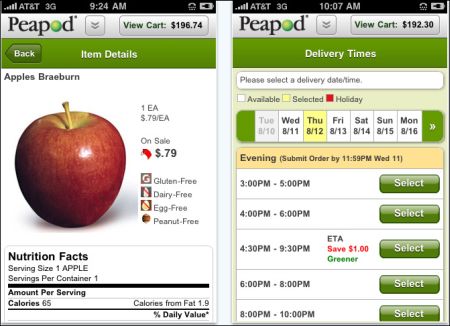It all began on a freezing January day. As the snow swirled around outside, my roommates and I argued about who was going to brave the cold to replenish our empty fridge. None of us wanted to make the trek to Whole Foods or Jewel, and somewhere in the back of my mind I remembered a friend once telling me she exclusively used Peapod for grocery shopping. Peapod is simple: you pick your groceries online, choose from a series of delivery time windows, and like magic, a delivery person will bring your package right to your door within 24 hours. As that wonderful delivery man marched bags of cereal, pasta, juice and fresh fruit up three flights of stairs and made his way into our kitchen, the dreaded concept of “grocery shopping” had vanished. I was instantly hooked.

Photo courtesy of ctworkingmoms.com
Since then, I have used Peapod for just about all of my grocery needs. It saves an enormous amount of time, not only because you don’t have to make the trip to the grocery store, but also because the search feature allows you to find exactly what you want (down to the specific brand and size) within a matter of seconds. It also saves your recently purchased orders to expedite the shopping process. Peapod has all the options that a large grocery store like Jewel might have, in addition to many of the higher quality products that are typically found at Whole Foods. You can also purchase health, beauty and cleaning products.

Photo courtesy of fastcodesign.com
However, an important question remaining for most customers (especially college students) is how much more you’re paying for this convenience, and whether or not it’s truly worth it. I decided to get to the bottom of this question by comparing Peapod to two of the groceries stores most frequented by Northwestern students: Whole Foods and Jewel. The most evident price difference is Peapod’s delivery fee, which is $9.95 for orders $60-$75, $7.95 for orders $75-$100, and $6.95 for orders over $100. It costs more to order more with Peapod (the minimum order size is $60), so it’s best to combine orders with friends or roommates. There is also a fuel surcharge of $0.99.
Delivery fee aside, we must also consider the price of the actual products. To see how Peapod’s prices compare to the other two stores, I constructed a sample grocery list of college staples (orange juice, pasta, frozen meals, etc.), and calculated the total for all three grocers. I used exact brand matches as often as possible, and in other cases I used the stores’ own brands or comparable products (based on size, quality, organic vs. not organic, etc.). While it certainly wasn’t an exact science, it still gave me a rough idea of the how the prices stacked up before tax. Jewel’s total was $64.43 and Whole Foods’ was $82.67. Before the delivery fee and fuel charge, Peapod was $70.93, and afterwards it was $81.85.

Photo courtesy of appscout.pcmag.com
If you’re looking for the most strictly economical choice, Jewel appears to be the clear winner; however, it’s important to consider that once an order on Peapod reaches $75 or $100 and the delivery fee goes down, Jewel’s lead becomes less pronounced. Peapod also offers free delivery after your first order for an additional 60 days, and if you pick certain delivery times, it will reduce the fee. Jewel is only more economical if you go to the grocery store with a strict grocery list that you absolutely won’t deviate from. With Peapod, you can track your rising total with the addition of each item in a side window and edit as appropriate. This tends to eliminate those impulse buys, and keeps the total lower at checkout.
If you’re mainly a Whole Foods shopper, the choice is even clearer. Even with delivery and fuel surcharge, Peapod tends to be slightly less expensive, and infinitely more convenient. It offers similarly high-quality products, and a comparable variety of organic and all-natural brands. Like Whole Foods, it also has an excellent prepared food section, perfect for busy students who want a delicious and low-maintenance meal.
Whether you live on or off campus, grocery shopping is a necessary chore, but it doesn’t have to drain your time. Peapod is the perfect tool for overscheduled students to reclaim that extra hour they would otherwise spend stocking a fridge. So say no to supermarket drudgery and head to www.peapod.com.




